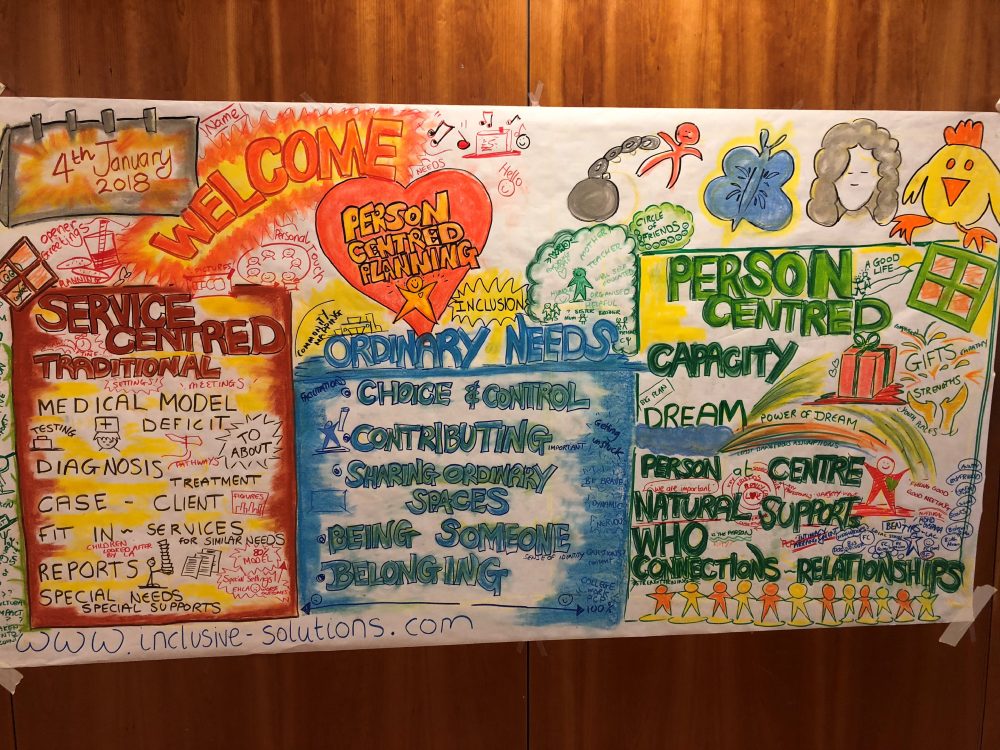
Person Centred Planning – for Local Authority, School or Multi Academy Trust Teams
This training is aimed at developing Person Centred Planning – for Local Authority, School or Multi Academy Trust professional teams.
Parents and carers can also participate in this training.
One day introduction to underlying values and practicalities of approach in schools – 100 people
2 Day skill training for 30 participants to learn PATH planning skills
1 day follow up after 3 months to problem solve issues and celebrate what achieved.
Person Centred Planning (PCP) is a way of expressing a set of inclusive values through a unique range of tools and techniques. The most commonly used person centred tool with children is a PATH – and it shows these values in action.
Why now?
The Children and Families Act 2014 sets out clear principles for supporting and involving children and young people in all aspects of the support and planning of their special educational need. The Special Educational Needs and Disability Code of Practice: 0 – 25 years provides the statutory guidance relating to part 3 of the Children and Families Act 2014. Embedded in its principles is the need for a stronger focus on the participation of children, young people and their parents/carers in decision making at both individual and strategic levels. The use of Person Centred Approaches provides the opportunity to fulfil those principles. Working in this way ensures the CYP and their parents/carers are at the centre of all decision making and future planning.
It provides an opportunity to engage directly with children and young people to discuss their needs, and plan how they can achieve the best possible outcomes. This should be integral to all planning for children and young people with Special Educational Need and Disability (SEND) throughout their lives.
Education Health Care Planning processes are required to be truly person centred at every stage, including annual reviews, so understanding this way of working has never been more essential.
Is this different to what we do already?
This person-centred way of working offers a radical new approach to visualising planning, empowering and directly involving children and those that care about them throughout planning meetings and allowing for inclusive, creative methodology which builds on and challenges existing practice in schools.
Core principles
The focus of inclusive, person-centred working is first and foremost on ordinary needs and not solely on special needs.
– Being somebody
– Contributing by sharing gifts and capacities
– Knowing people and having relationships
– Having choice and control
– Sharing ordinary places – being present in local spaces and having a valued role there
The training is delivered by Inclusive Solutions who are Educational Psychologists with a national reputation for training and person centred planning with schools over the last 16 years.
In this training, you will learn how to facilitate with a child, family, team or an organisation to think together around their preferred future or about a challenge or issue. Here is an opportunity to experience first-hand the person centred, futures planning tool – PATH (Pearpoint, Forest et. al. 1989).
This course will provide participants with a practical introduction to person centred planning and approaches, including examples of best practice in using person centred approaches in schools. The course will explore the underlying values of person centred approaches, provide an introduction to the person centred planning tools and link this to national policy and guidance.
Participants will gain:
1 Knowledge of person centred planning and approaches
2 An understanding of how person centred approaches can be used in schools
3 A basic knowledge of the person centred review process and where to find out more information
4 The skills to gather information about what is important to and for the children and young people they support
5 An understanding of PATH and situations in which this process could be used in school
The course answers these questions:
• What are person centred approaches?
• How can we use person centred approaches in our school?
• What is person centred thinking and how can it be used in schools?
• How can we learn about what is important to and for the child or young person and share this information?
• How can we make sure that the child is at the centre of their annual/transition review?
www.inclusive-solutions.com
Trackback from your site.
